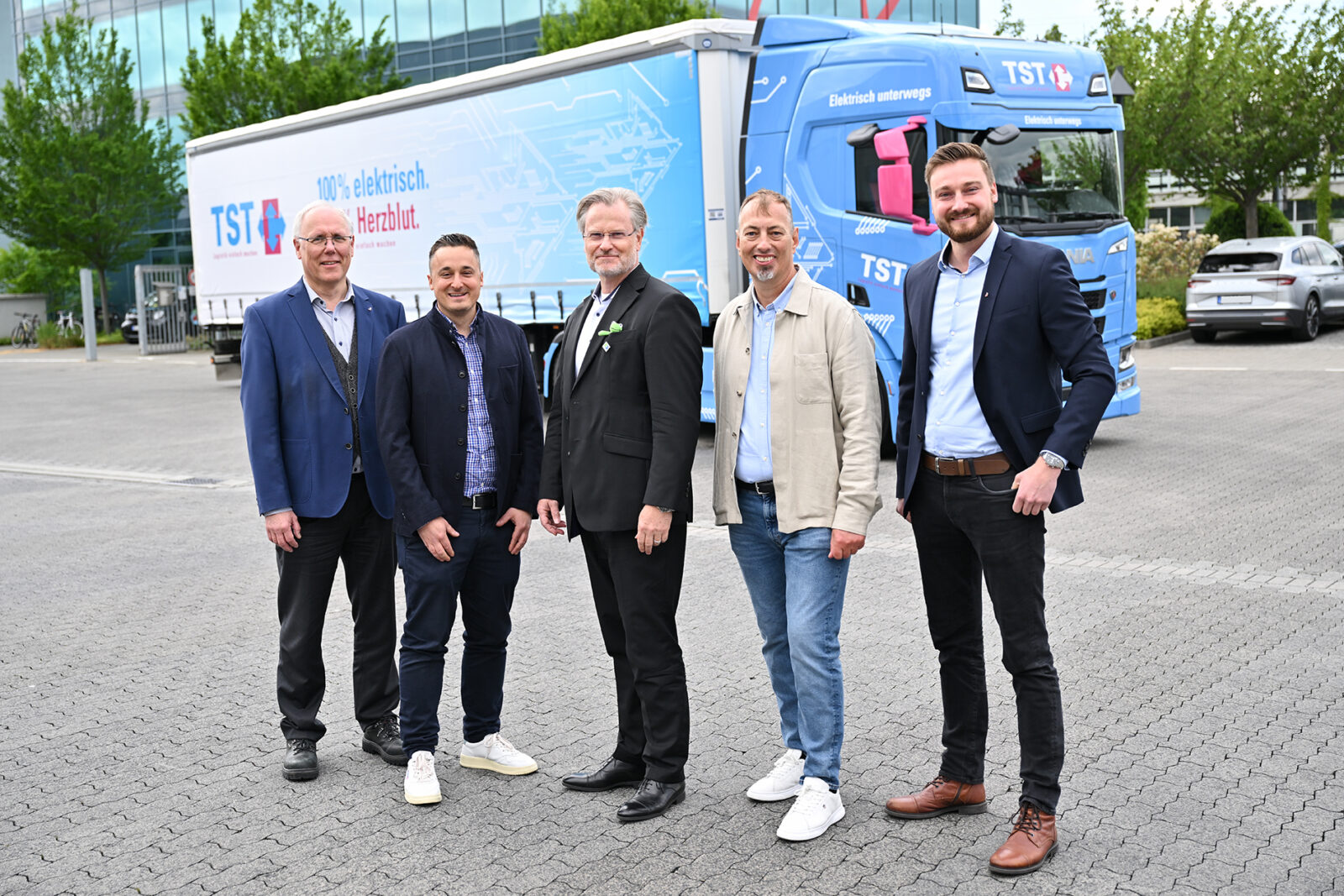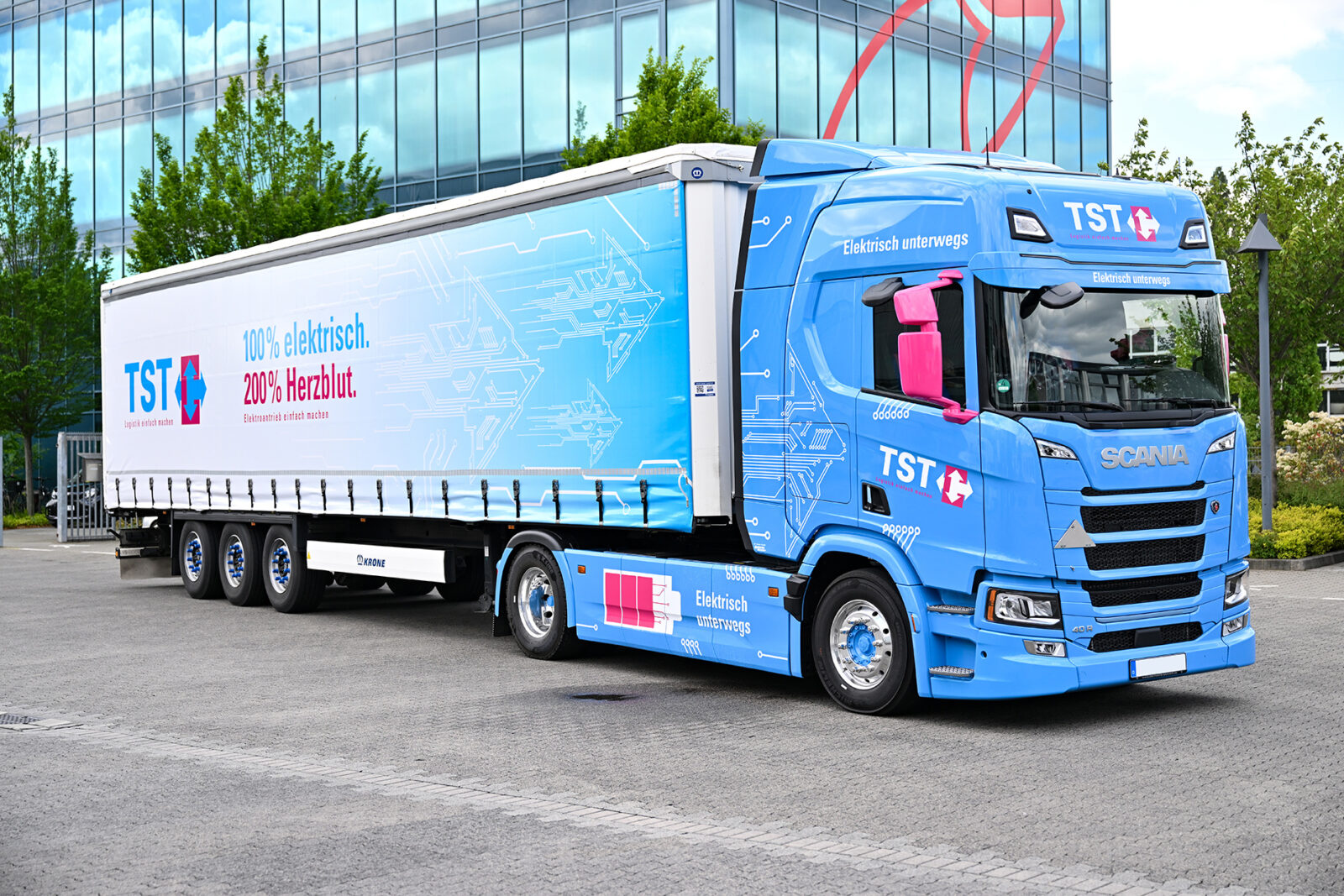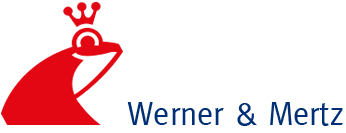First E-Truck for Werner & Mertz on the road
Another building block expands integrally sustainable focus
Family-owned Werner & Mertz with its well-known Frosch brand has been a sustainability pioneer from the very beginning. The medium-sized company based in Mainz pursues the goal of staying at least one development generation ahead of ecological benchmarks in all elements of its produts, from formulas and packaging to production conditions. That includes logistics too.
Since 2018 Werner & Mertz Service & Logistik, a wholly-owned subsidary of Werner & Mertz, has been working on increasing sustainability in logistics with alternative drive concepts. One work-study employee even researched drive alternatives as part of her master’s thesis. For a long time, however, alternatives were neither economical nor available. But as of May, battery-operated trucks have been shuttling cleaning products made by the Werner & Mertz Group between warehouses in Mainz and Worms.

Charging station in Worms opens up new options
A special opportunity arose recently when the long-term logistics partner TST (Trans Service Team) set up a new charging station for E-trucks, which is operated with TST-produced solar energy, close to the Werner & Mertz warehouse in Worms. Energy for the station is generated by a photovoltaic system installed on the roof of the TST logistics center. As trips to a charger are eliminated, the setup is more economical. The charging station for battery-operated trucks is equipped with super chargers and large-scale battery storage and may be used by other providers.
“With the semi-public charging infrastructure, we would like to help small transport companies which otherwise would not have the chance to get into E-mobility. Above all, we want to help our customers reach their climate goals,” says TST Managing Director Marcel Bicking. “We are proud to be able to transport the products of our long-time customer Werner & Mertz in this climate-friendly way.”
E-Truck use another building block in the integrally sustainable corporate philosophy
„We prefer partners that implement integral sustainability with a high level of ambition similar to ours for product groups. TST has a systematic approach that goes well with our corporate philosophy,“ says Werner & Mertz owner Reinhard Schneider.
“The use of alternative drives in logistics is yet another building block in the expansion of our integrally sustainable direction. At the same time it contributes to continuous improvement in our Environmental and Energy Management,” says Yannic von Raesfeld, Head of Sustainability Management at Werner & Mertz.
With internal and external audits, Werner & Mertz puts its organization and processes to the test at regular intervals and works unfailingly on improving environmental and energy management. Another important factor includes demanding certifications (including ISO 14001 and ISO 50001) and the annual EMAS validation at both production sites in Mainz and Hallein, which has been obtained for more than 20 years.

Outlook
Earlier this year, Werner & Mertz Service & Logistik put out to bid the regular shuttle traffic to Worms. The requirement was daily use of at least one E-vehicle.
The model of use is as follows: One vehicle completes three circulations of 134 kilometers each per daytime shift. The vehicle is ordered continuously and is driven by a regular driver. Overnight the vehicle is electrically charged. As needed, up to three vehicles can be deployed simultaneously for nine circulations per day. TST offered very favorable financial conditions for the test deployment.
In the future the TST Group wants to set up a charging network under the new brand name “PamSun” across Germany and convert 80 to 90 percent of its transport to E-mobility. That could be of interest to Werner & Mertz for future bid requests, for example, for transport to Hallein near Salzburg, Austria, where the family company also manufactures its products.
“When we request bids now, we always ask for alternative proposals for battery-operated variants and check very carefully whether the variant is ecologically reasonable and if it remains economically viable,” says Werner & Mertz Service & Logistik Managing Director Andreas Hardt.
Technical details of the deployed E-trucks
The vehicle type E-Scania 40R has an engine performance of 400 kW (about 540 hp) and a maximum torque of 2800 Nm. The battery capacity is 624 kWh (gross) or 518 kWh (net). At an outdoor temperature of 0 °C and a total towing weight of 40 tonnes, the truck aachieves a range of more than 350 kilometers. At outdoor temperatures from 15 to 20 °C and the same total towing weight, the truck’s reach increases to more than 400 kilometers. Energy consumption lies between 80 and 130 kWh per 100 kilometers. Maximum charging capacity is 375 kW DC with 500A so that the truck can be charged from 0 to 80% in 60 minutes and from 0 to 100% in 85 minutes. The normal charging time is approximately 700 minutes from 0 to 100%. The E-Scania 40R achieves a top speed of 90 km/h, has an empty weight of 11,100 kg and a permissable total weight of 44,000 kg.



